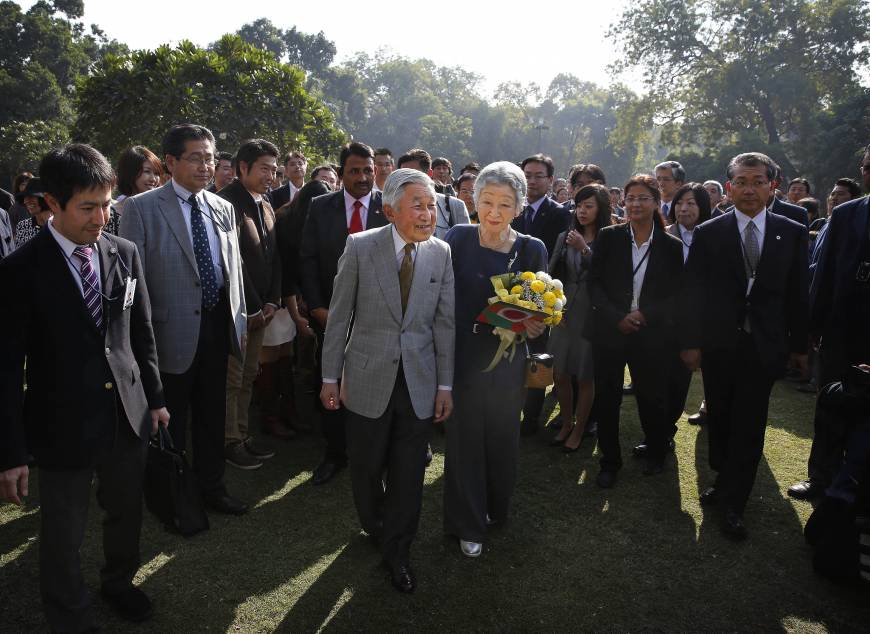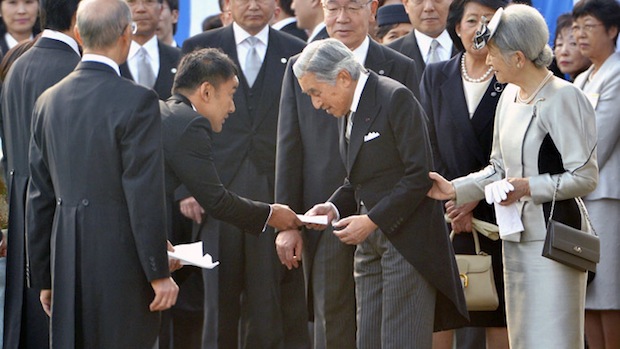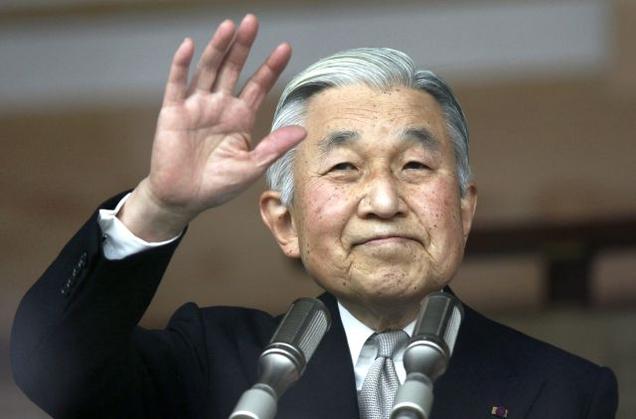
Emperor Akihito with Empress Michiko. He's supposedly the 125th member of his family to reign since the legendary Emperor Jinmu. | AP
The other day I took a taxi ride and struck up conversation with the driver. Amongst other things, he told me he was a Communist but that he liked the present emperor who was doing a good job of representing Japan. It reminded me of a discussion I once had with a royalist in Britain, who was angrily attacking Prince Charles for not doing his job properly. I’m not a royalist, I told him, but I generally agree with the line Prince Charles takes on environmental, architectural and social issues. “Well, I am a royalist, and I don’t!” my opponent replied testily.
There’s a similar situation in Japan, where right-wingers who are most vocal in defence of the imperial system find themselves at odds with the views of the emperor. Yasukuni is an example, a shrine which two reigning emperors have made a point of not visiting since Class A war criminals were secretly enshrined there in 1978. ( In 2006 it was revealed that Emperor Hirohito had expressed strong displeasure with the enshrinement.)
Browsing the internet about such matters led me to the following article from The Japan Times.
*****************************************************
Emperor’s apparent liberal leanings jar with Japan’s right wing
Japan Times BY PHILIP BRASOR DEC 7, 2013
In the media debate about the state secrets bill, much has been said about the public’s right to know. Participants in a democratic society must be informed to make decisions in their interest, and critics of the bill, which ostensibly protects matters of national security, believe it will be used to keep people in the dark about anything the government doesn’t want revealed or discussed openly.
But even before there is a law limiting the dispersal of official information, Japanese citizens operate with a built-in filter that controls what an individual believes he or she has a right to say. According to documentary filmmaker Tatsuya Mori, this self-censorship function is a holdover from the prewar regime’s effort to monitor the hearts and minds of the populace, and its main tool in that effort was emperor worship.

Yamamoto Taro seen here handing the emperor an anti-nuclear petition, considered a grave breach of protocol (courtesy japantrends.com)
In an interview published in the Asahi Shimbun on Nov. 27, Mori talks about the recent controversy surrounding rookie lawmaker Taro Yamamoto, who handed Emperor Akihito a letter during the annual autumn garden party at the Imperial Palace. The actor-turned-politician wanted to draw the Emperor’s attention to the plight of those affected by the crippled Fukushima nuclear power plant, but by personally giving him a note without obtaining prior permission he was violating protocol. The reaction was swift and hard, and came from across the entire political spectrum.
Yamamoto was admonished by the Diet. Mori thinks his action revealed a “lack of common sense,” but he did not break any laws, regardless of what the ruling Liberal Democratic Party implied. Mori asked a group of university students for their opinion of the incident and everyone said Yamamoto had been “rude,” even “blasphemous.” One student seemed deeply offended by the fact that Yamamoto used “only one hand” to present the letter.
What struck Mori was that all of these young people were born during the current Heisei Era, and yet their approach to the Emperor was effectively no different from the public’s reverence prior to the end of World War II, when Hirohito was considered a deity. He concluded that the “emperor system” (tennō-sei), which was once inculcated by the government, has become “internalized.” All Japanese people carry it with them, as if it were hard-wired into their consciousness. Though they no longer think of the Emperor as a god, they believe he possesses special rights and is cocooned within a matrix of taboos. As a result, he said, they are “docile in the face of authority.”
When the interviewer points out that the Emperor, whose role is defined in the Constitution as being symbolic, is not supposed to be “used” for political purposes, Mori says the Emperor cannot avoid politics. The United States decided not to remove Hirohito after the war so as to make it easier for the Japanese people to accept its authority during the Occupation. He was used by the American military to achieve its goals, just as the wartime Japanese government used him for its own purposes. Though there are still arguments regarding Hirohito’s complicity in the war, blame was borne by Class-A war criminals whose prosecution, most historians agree, was arbitrary.
In April last year, the government celebrated the 60th anniversary of the end of the American Occupation with a ceremony attended by the Emperor and Empress. Since the LDP was sponsoring the event, it was politically “using” the Emperor, and when the Imperial couple left the stage, shouts of “Banzai!” — a remnant of emperor worship — erupted from many members of the audience, including Prime Minister Shinzo Abe. Recordings on government websites eventually cut this portion of the ceremony, but not before Mori saw it. When the shouting started, Mori said, “The Emperor looked much more perplexed than when he received the letter from Yamamoto.”

An AP photo of Emperor Akihito, more liberal-minded than many of those who most ardently support the emperor system
It’s not the first time the Emperor has resisted, passively or actively, the role that some want him to fill. In 2001, during a press conference to mark his birthday, he remarked that he felt close to the Korean Peninsula, since he understood his ancestors came from there. Rumors persist that he wants to visit South Korea but that the government won’t let him, saying it doesn’t want the Emperor to be used politically by South Koreans. But isn’t preventing him from going also motivated by politics?
Mori, who once planned a documentary about the imperial system, likes the Emperor because he appeals to his own liberal leanings, which is why genuine right-wingers, such as former Tokyo Gov. Shintaro Ishihara, aren’t interested in the Emperor as a person. Their agenda really has no use for the kind of open-mindedness the Emperor occasionally demonstrates.
Another progressive pundit, sociologist Shinji Miyadai, said the same thing in a recent interview on Videonews.com, expressing admiration for the Emperor for something he said during the 2004 autumn garden party, which didn’t receive nearly as much attention as the Yamamoto faux pas. Shogi player Kunio Yonenaga, a member of the Tokyo municipal government’s educational committee at the time, proudly told the Emperor that it was his job to make sure all public schools sing the national anthem and raise the flag. The Emperor responded — and everyone heard it clearly — that he hoped Yonenaga wasn’t forcing them to do it.
As Miyadai points out, the administration of Keizo Obuchi had already stated that schools could not be legally compelled to sing the anthem or salute the flag, even if local governments like Tokyo’s have done exactly that, so the Emperor was clarifying the law in front of Yonenaga. What the shogi player said may not have been a breach of protocol, but it was definitely the espousal of an illegal act. And yet he received no criticism in the press or from the government.
In contrast, Yamamoto, by handing the Emperor a letter, was advancing an agenda that he not only had the right to advance, but also the responsibility, since it was the basis of the platform on which he had been elected. “If I had to explain to a foreigner why Yamamoto’s action was a problem,” Miyadai said, “I don’t think I could do it.”

Thank you for this fascinating article. I love the tension between conservative symbol and more liberal reality. I wonder, however, if “god” is a helpful translation of “kami,” My students at Kansai Gaidai (as recently as 2010) were almost unanimous in telling me that they had been taught that the Emperor is a kami, worthy of absolute reverence. Perhaps “kami” is closer to the Greek “daimon” (powerful spirit, or Nature spirit) rather than “theos (god)?”
Hi John, and thanks for the input… Certainly god is different from kami as you point out. I don’t know much about the Greek daimon, though a good argument has been made for keeping ‘kami’ as it is when writing in English. That might be the best solution in the long run, though it’s problematic at present since the great majority of people will have little understanding of the term…
John, I haven’t been over here to visit in a while, and I have to thank Claude in Wyoming for pointing me in this direction. Your site is always so fascinating!
Regarding the above, “Emperor worship” was far from the only touchstone of Japan’s war-time military junta. There is a whole range of ritualistic behavior. From a Confucianist perspective, as explained to me by my husband, the normal people who make up the backbone of a society are willing to undertake this complex polite behavior in order to get along well with others, while those who are not willing to do that demonstrate their lack of reliability. I saw his point amply demonstrated among a group of hang glider pilots here. Persons with typical psychopathic traits were unwilling to go the extra mile. In other words, there may be some long-term benefits to society from this sort of behavior in impeding the progressive advancement of psychopaths to positions of power over others. One researcher on the subject said that psychopathy had been found to be less prevalent in Japan, but I have no idea how that was quantified, and I would be suspicious anyway, because there is also a tendency to whitewash things in Japan.
The bad weather in August prevented me from getting back to the Ochuudo on Mt. Fuji. You have to be in good shape for the isolated rugged parts, and week after week of waiting for good weather does not help. But I should write up what I discovered last year and post it here.
Thank you, Pat, for the stimulating feedback. I hadn’t expected my piece on emperor worship to be related to hang gliding, but it gives a unique perspective which you alone I would imagine are qualified to present. As for Ochuudo, the fact that you have had to wait weeks for the weather to be good enough to climb is in itself a tantalising glimpse of how fascinating an article it would make. I’m sure Green Shinto readers would be delighted for anything you may be able to produce…
“In other words, there may be some long-term benefits to society from this sort of behavior in impeding the progressive advancement of psychopaths to positions of power over others. One researcher on the subject said that psychopathy had been found to be less prevalent in Japan, but I have no idea how that was quantified, and I would be suspicious anyway, because there is also a tendency to whitewash things in Japan.”
Fortunately, their is a miraculous solution, Rev Ormsby. B|
Just send them practicing Kaihôgyô at Hiei-zan ! If they fell, they also fell on their swords or hang themselves (or someone helps them doing it). And if they succeed, they become Bosatsu. In any case, problem solved ! :v